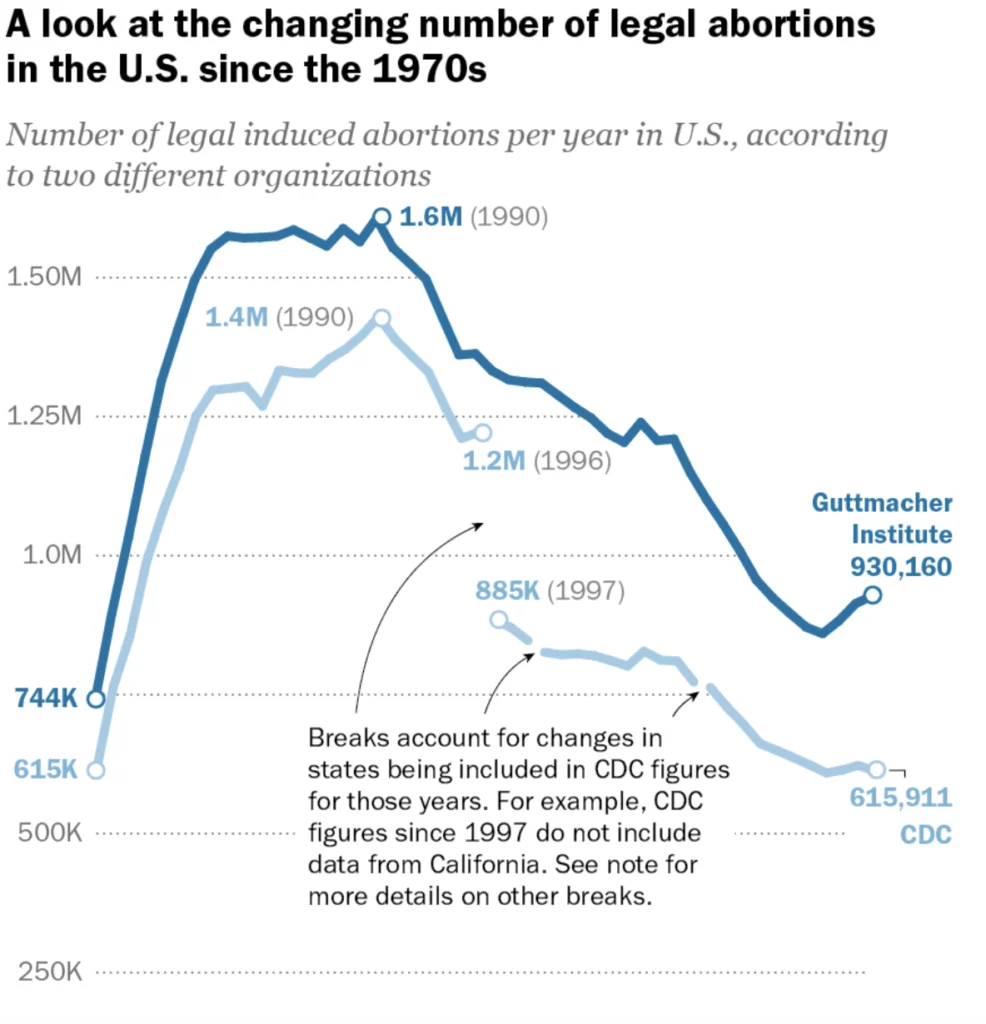After 50 years of struggle, US conservatives won a long-sought victory when the US Supreme Court Dobbs v. Jackson Women’s Health Organization decision overturned Roe v Wade. “A necessary but woefully insignificant victory in the cause of contending for life, the dignity and sanctity of every single human life, including life in the womb,” is how Southern Baptist leader Albert Mohler described it recently.
“Insignificant” is unexpected language to characterise a victory Evangelical and Catholic activists have invested so much in over five decades. Mohler is pointing out that Dobbs is not a knockout blow to the abortion industry in the US.
The “victory” could even mean more abortions, not less than might have occurred under Roe. The downward slope of the graph of abortions will continue, but the effect post-Dobbs on it is harder to predict. Here’s why.
Pro-lifers lose votes in conservative states
In early January 2023, in the very conservative state of South Carolina, the State Supreme Court struck down the state’s abortion ban. This wiped out a state law that banned abortion after six weeks – a so-called “heartbeat’ law that effectively barred all abortions except for cases of rape or incest. Instead, the court pushed the state back towards the old standard of 20 weeks.
In August, a referendum to ban abortion in Kansas was defeated. The “Value Them Both Amendment” would have stated, “the constitution of the state of Kansas does not require government funding of abortion and does not create or secure a right to abortion.” This means that abortion remains legal in Kansas.
A referendum in Kentucky, pushed by conservatives to add a statement that there is no right to abortion, or any requirement to fund abortion, into the State Constitution, failed with a “no” vote of 52.3%.
A referendum in Michigan, “proposition 3,” adding a “right to reproductive freedom” to the state constitution, won with a 56% vote. (Pic shows campaign material for the Michigan campaign)
Kansas, Kentucky and South Carolina are conservative “red states.” In Kansas, the Republicans won the 2022 senate race with 60.1 per cent of the vote. South Carolina’s Senator Tim Scott, an African-American Republican, was returned with a 62.9%vote. Another well-known Republican, Senator Rand Paul, won Kentucky with 61.8%
There was no Senate race in blue state Michigan, but the Democratic Governor Gretchen Whitmer retained her office,
The progressive pro-choice moves in the US have woken up to the fact that the progressive side will win any referendum-like vote on abortion and will attempt to bring about more of these votes. Conservatives will oppose them but be on the back foot arguing against a popular voteAs a result, thehe number of states banning abortion will reduce. It will certainly not dwindle to zero, but it will be reduced.
The upshot is that the overturning of Roe v Wade, which puts the states in charge of setting laws about abortion, does not mean an abortion ban in even some very conservative states.
The populations of each of these conservative “red” states have voted to allow abortion.
Polls show that some sort of compromise, not too dissimilar to Roe, is favoured by a large majority of US voters nationwide. Unfortunately, this means that should there be a popular vote on abortion in more “red” states with abortion bans, pro-lifers will continue to lose.
Medical Abortions
A significant factor is the likelihood of medical abortions becoming easier to get, even in states with a ban. Medical abortion involves taking two different drugs, mifepristone and misoprostol. “On December 16, 2021, the FDA removed the in-person dispensing requirement for mifepristone and expanded the distribution to include certified pharmacies in addition to certified clinicians,” KFF, an authoritative medical news site, reports. “This change removed the requirement to dispense the medication in person and expanded the opportunity for telehealth in states that have not banned abortion.”
A further change in early January 2023 allows pharmacies certified by the manufacturers to dispense mifepristone directly to patients.
Stung by the Dodds decision, some progressives see making medical abortions more widely available as a next step. New York City’s mayor plans to provide free abortion pills at four clinics. Lower-income patients are the target, with the catchment areas of the clinics aimed to increase the availability of abortion.
Massachusetts has passed a “Telemedicine shield law” attempting to protect doctors who break the laws of anti-abortion states by helping the women in them have abortions at home. Other states, such as New York, may follow.
While further legal access to medical abortions is on hold in some states as state-based laws restrict their availability, a change in federal law would override that. That is likely if the Democrats take both houses in congress in the future.
Planned Parenthood offers to send abortion medication by mail for $US550.
Progressives want to go further
In progressive states such as New York State or California, abortion laws have been loosened since Roe v Wade was overturned. For example, in California, abortions, post-viability, are legal when necessary for the life or health of the mother – similar to Australian law, which opens the way for more late-term abortions.
Voices on the left, such as this quote from the feminist magazine Jezebel are calling not to restore Roe but to go much further “It’s time to ask ourselves: Why would we fight to restore something that didn’t guarantee true reproductive freedom for everyone? We can do better, and it starts by realising that we can demand better. We should be treating abortion not as some kind of a political football but as a fundamental human right.”
The president of Planned Parenthood, a significant abortion provider, writes in Teen Vogue, “The truth is, Roe was necessary, but it was never grounded in equality. It never actually guaranteed that people could get an abortion. Hurdles like distance, money, time off work, and other restrictions have stood in the way of people’s health for over 50 years. The heartache of losing Roe is one that many people have been feeling for a generation.
“But I’m letting go of Roe because I’m betting on better for generations to come.”
If the Democratic Party were to win control of both houses of congress, codifying Roe would be the baseline. And they would likely get some Republican support.
The Republicans are the dog that caught the car after chasing it for decades. “Six months after the Supreme Court overturned federal abortion rights, the test has grown a whole lot harder — and potentially more politically treacherous,” The New York Times reports.
While some conservative campaigners call for abortion bans with no exceptions for survivors of rape or incest, others who are more moderate call for an expanded social safety net to reduce the pressures that drive people towards abortion.
Blake Masters, a Republican Senate Candidate in last year’s election, scrubbed his websites of “no exceptions” material to rescue his campaign. He lost despite the cover-up.
Now that the overthrow of Roe is the theoretical proposal it was for decades, there are swing votes for the Republicans to lose as well as conservative votes to hang on to.
In a sign of things to come at this year’s post-Dobbs March for Life in Washington, only two federal politicians turned up. No Donald Trump, no Mike Pence.
A decrease at first, but what then
In the first two months since Roe v Wade, there was a decrease in abortions. “In states with bans and restrictions, there were about 22,000 fewer abortions in July and August, compared with the baseline of April, before the decision,” The New York Times reported.
“In states where abortion remained legal, the number of abortions increased by roughly 12,000, or 11 per cent.” This was the immediate aftermath of the Supreme Court ruling. Since then, the number of Abortion ban states has decreased, and as the effectiveness of forcing a state’s decision into a referendum is noted by pro-Choice activists, that number will increase.
Another factor in reducing the effectiveness of overturning Roe v Wade is an increasing trend towards medical abortions.
As the abortion rate has been falling in the US, before the Supreme Court’s Dodds decision by a steady one or two per cent a year, it may be that the rate of decline continues. The prediction above is better stated: despite an overall decrease in abortions, the Dodds decision could lead to a slower decline rather than a faster reduction, as state anti-abortion laws are wound back and abortions by post increase. Here is a Pew Research graph showing abortion figures from the CDC and Guttmacher, another authoritative research institute.

Dobbs in context
Mohler places the Dobb’s decision that overturned Rove v Wade in context. “The fact that Roe v. Wade was handed down in 1973 is a horrifying scandal and stain on the American conscience and on our history,” he writes. “The fact that it stood as a Supreme Court precedent for about 49 and a half years, almost 50 years, just adds to that scandal. But it may be that the greater scandal is the [effective Roe had]on the American conscience with so many millions of Americans just assuming that abortion is, morally speaking, no big deal.
The pro-life case suffered a setback 50 years ago. But it now seems the path towards a pro-life future won’t be won in the courts of short-term politics. Whatever wins the pro-life cause gains in conservative Staes will be overmatched by moves in the more populous progressive states. Referenda-style popular votes are dangerous for pro-lifers.
Anti-abortion laws will become less relevant as abortion medication through the mail becomes more common.
Christians may need to rethink the effectiveness of political action. Both regarding whether they command enough support and whether abortion laws work, especially with porous state boundaries.
The future of Christian concern on abortion may no longer fit an alliance with advocates for small government. Instead, a kinder and gentler society determined to welcome new life without putting undue burdens on women is required. This is a more significant change than simply changing a law.
It involves a change of heart and the sacrificial service of others that might lead to society changing its mind. But, unfortunately, that could take much longer than the campaign to overturn Roe.

